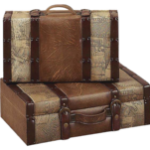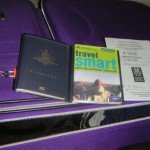TRAVEL TIPS: STUDENT TRAVEL
Posted by: kirsty_wilson in Travel Tips, tags: Budget Travel, Smart Traveller, Travel, Travel TipsStudent’s Guide To Travelling Overseas
 This article was written by Jeremy Cabral who is part of the team at Credit Card Finder, Australia’s most popular 100% free Australian credit card comparison website.
This article was written by Jeremy Cabral who is part of the team at Credit Card Finder, Australia’s most popular 100% free Australian credit card comparison website.
Students looking to travel overseas are often in a tight financial situation. Even if you supplement your studies with a part-time job you are probably looking for smarter ways to travel – ways that let you enjoy your trip while not having to scratch and scrimp your last pennies.
How to Let Your Hair Down Guilt-Free
If you want to enjoy a trip to a sun-soaked beach guilt-free you need to get your finances well in order before you leave home. A great way to do this with relative ease is by putting some money aside each week as early as one year before you leave for your holiday.
It would be foolish to travel with a credit card in tow but no money in your bank account. A sure recipe for financial disaster on your return home.
Handy Tips for Getting Cashed-Up
The following savings tips can help you acquire a nice nest egg for your next holiday. Most of us spend way too much money on things we don’t really need; expenses such as cups of coffee on your way home from uni, gadgets that go out of fashion tomorrow and clothes you won’t be able to wear in 6 months because you’d be laughed at.
Instead, why don’t you aim to inhibit those spending urges in order to save money for a better cause – your next holiday.
Consider Prepaid if You Suck With Credit
Prepaid cards are a great alternative to credit cards. You won’t end up with debt because you can only spend what is yours to start with. If you need extra funds on your card before you leave home you could ask your family to be paid in “cash” for birthdays, Christmas and any other occasion where you’d normally receive presents. If you do, load the cash to your new prepaid card, then keep it tucked away until you are ready to travel.
 Consider Your Destination
Consider Your Destination
Some exotic destinations make it very hard to stay fluid with cash. It is a good idea to research your holiday destination because you might need a combination of cash, credit card, prepaid card and travellers cheques to keep cashed-up.
Keep Your Documents in Order
If you are planning an overseas trip, chances are that you might need a visa to visit the country of your choice. The last thing you want is to be stuck at the airport in a foreign country because you failed to bring the necessary documents with you.
Check to make sure your passport is valid for a minimum of 6 months after your planned return home. Trust me, you won’t be the first student stranded overseas because his passport has expired.
If you are planning to do a working holiday you will need the appropriate International work visa. Plus you might want to check the following to cover all of your bases:
Where to Stay
Students love to bed for the night on the cheap. Thanks to a wide range of networks you can stay in comfortable and safe surrounds while mingling with like-minded people. Try the following for fun and to save money:
 See the World While You Are Young
See the World While You Are Young
Travelling is one of the best education you can have. It will teach you respects, introduce you to other cultures and make you new friends in all corners of the world. Chances are high that you’ll come home a more confident, relaxed person and once you catch the travel bug it will accompany you for the rest of your life. Make the most of it!

 Litchfield, CT “How big is a canoe? Can I fit it in my hand luggage?”
Litchfield, CT “How big is a canoe? Can I fit it in my hand luggage?” 

 Entries (RSS)
Entries (RSS)